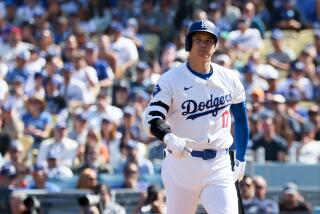Column: It’s a special moment for Shohei Ohtani as he clubs his first home run at Angel Stadium
- Share via
The stadium looked half empty, as was the case many times here last year and the year before that.
Only this wasn’t the same place. There was a previously undetectable electricity, an unmistakable excitement.
Shohei Ohtani made Angel Stadium the place to be Tuesday night, a miracle last performed when the Rally Monkey first appeared on the video scoreboard here almost two decades ago.
A week after he singled in his first major league at-bat and two days after he won his first major league game as a pitcher, Ohtani stepped into the batter’s box of his new home stadium for the first time.
He homered.
The three-run homer against Cleveland Indians starter Josh Tomlin was produced by the most elegant of left-handed strokes, a first-inning line drive that sailed into the sea of outstretched hands in the right field stands.
By the end of the Angels’ 13-2 victory, Ohtani had three hits, each of them struck with a shocking degree of violence.
Somehow, through all of this, Ohtani has managed to radiate the innocent enthusiasm of a boy from rural Japan. In that regard, his teammates have helped.
After circling the bases and touching home, Ohtani returned to the bench to find the other Angels doing what baseball players do these days when a player hits his first home runs: Their eyes were on the field and their backs were turned to him.
“I didn’t really know,” Ohtani said in Japanese. “But when I got there, I thought, ‘I wonder if it’s something like that …’ ”
Ohtani raised his arms and celebrated on his own, then reached over to his right and embraced Ian Kinsler from behind. Kinsler returned the embrace. In an instant, Ohtani was mobbed.
Ohtani high-fived Mike Trout and smiled.
“I was happy,” Ohtani said.
There was another welcome-to-the-team experience after the game. As a completely unsuspecting Ohtani was conducting a postgame interview on the field, Kole Calhoun sneaked up behind him and emptied a cooler full of ice water on him.
“I had seen the ice water on television before,” Ohtani said. “It was good. He got me, but it made me really happy.”
The three-hit night included a second-inning single, a line drive that powered through the outstretched glove of second baseman Jason Kipnis. His third hit came in the eighth inning on another line drive, this one to center.
Ohtani was nonchalant about his achievements, but they were historic by nature. Before him, the last player to win a game as a pitcher and hit a first-inning home run within the next two days was Babe Ruth, who did it on June 13-14, 1921. The last rookie with three or more hits and one or more wins in his team’s first six games of a season was Dutch Stryker of the 1924 Boston Braves.
So much for an adjustment period. So much for how he looked in spring training.
Only seven days ago, skeptical observers were counting down to when Ohtani would be demoted to triple-A Salt Lake or forced to abandon hitting.
Common sense dictated that it was hard enough to only pitch or only hit in the major leagues, that it was impossible to do both, that a hitter couldn’t develop any rhythm when limited to a handful of at-bats every week.
Except conventional wisdom isn’t applicable to every situation, to every person.
Ohtani could be the outlier. He certainly is physically.
He stands 6 feet 4. He throws a baseball faster than any player on the team. In batting practice, he hits them farther than anyone too.
And if Ohtani isn’t the fastest runner on the team, he’s a close second to Trout.
Even in the company of the top baseball players on the planet, he’s a physical freak. He’s the pitcher with a beard in Little League. He’s the 13-year-old kid who can already dunk. He’s a drug-free Josh Hamilton.
Observe him throwing and hitting for a while, listen to how his former instructors in Japan talk about his intelligence, take in how Mike Scioscia and others on the Angels describe his work habits, and performances like his on Tuesday start to feel inevitable, if not like the start of something more.
As for how he managed to develop timing at the plate without hitting in games, Ohtani said, “The games in which I pitch are part of my sense of rhythm. It’s not something I just started.”
The questions now about the possibilities: How many more games can Ohtani win? How many more home runs can he hit? How far will he hit them?
Ohtani will be the team’s designated hitter again Wednesday.
Follow Dylan Hernandez on Twitter @dylanohernandez
More to Read
Go beyond the scoreboard
Get the latest on L.A.'s teams in the daily Sports Report newsletter.
You may occasionally receive promotional content from the Los Angeles Times.







